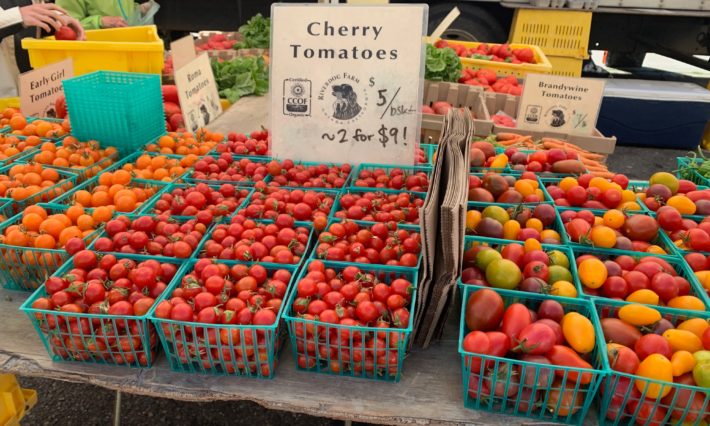By Josephina Shin
When you hear the words “Farmers’ Market,” you may automatically think organic, fresh and healthy. But the Berkeley Farmers’ Market — three times a week at various locations year-round — sells not only organic and pesticide-free produce but also soup, kettle corn, gelato and coffee.
The Ecology Center has operated the markets since 1987. Theirs were the first in the country to ban methyl bromide, a toxic pesticide most commonly used on strawberries and a factor to the depleting ozone layer. According to the Ecology Center website, the use and sale of GMO products have also since been banned.
Staffers at the Ecology Center’s booth also educate both customers and passersby about environmentally-friendly gardening and approaches for zero-waste.
In addition, The Alameda County Master Gardeners, who regularly attend the Berkeley markets, help spread their knowledge by offering free pamphlets and act as garden consultants, with the goal of keeping the environment healthy.
They were trained by the University of California system “to encourage people to garden, grow their own foods, not use chemicals and the least invasive ways to keep their gardens fresh,” Kitty Mindel, an Alameda County Master Gardener, said.
The vendors at the Downtown Berkeley Farmers’ Market operate by the principle “everything we have here we grow ourselves,” said Marco Avalos of Avalos Farm. The Avalos Farm has been a family enterprise in Hollister, California, for over 20 years. Although they drive 90 minutes multiple times a week to attend Berkeley Farmers’ Markets, Avalos said, “People here appreciate that we don’t use pesticides and fertilizers.”
Avalos Farm is one of many pesticide-free vendors at the Berkeley markets. They also advocate for zero-waste, using the food that they don’t sell for other markets or for compost. Having regularly attended Berkeley markets and being an environmentally conscious vendor, Avalos Farm has built a relationship of trust with their patrons.
In addition to consumers, other vendors, such as Rasa Dresser, trust the produce offered at the Berkeley Farmers’ Market because it is environmentally sustained.
Dresser owns and operates The Big Little Bowl of Soup. “Everything is handmade and 100 percent organic,” Dresser said. “I source all of the produce from either the Farmers’ Market or Berkeley Bowl and Monterey Market, two local produce stores.”
Another way Dresser advocates for no waste is by using Mason jars which customers can return them or reuse. However, his main “intention,” said Dresser, was to allow even the homeless and less fortunate to have access to good and fresh food. This is possible because Dresser leaves out a jar of money from which the homeless can take cash to buy a bowl of soup.
“Originally, I started making soup for the homeless population, and my goal was to make a soup that was as nourishing as I could possibly make it,” Dresser said. “I wanted to make it plant-based; that’s important to me as well. It’s good for the environment and good for people’s health.”
